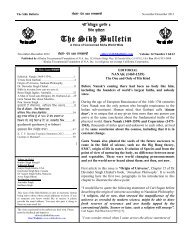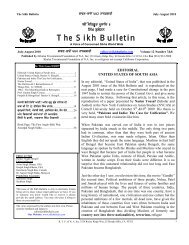Create successful ePaper yourself
Turn your PDF publications into a flip-book with our unique Google optimized e-Paper software.
<strong>The</strong> <strong>Sikh</strong> <strong>Bulletin</strong> vYswK 537 April 2005<br />
is that undesirable human beings and dogs would have been<br />
kept away from this walled city; thereby safeguarding its<br />
residents. We are told that, in complete segregation, the<br />
residents of the “New Jerusalem” would have experienced no<br />
more sorrow, no more death, no more crying and no more<br />
pain [Revelation 21:4]. This would have been the most<br />
utopian life on the new earth. What kind of life would it have<br />
been in the new heaven <strong>The</strong> Bible is silent on that matter.<br />
Reading the Revelation several times and discussing the<br />
subject with many friends, I can say that the new earth and<br />
the new heaven are two separate entities and the “New<br />
Jerusalem” was to be situated on the new earth.<br />
<strong>The</strong> above analysis makes it clear that had these events taken<br />
place, the new heaven would have remained empty, would it<br />
not Perhaps the new heaven would have been reserved for<br />
those who had opted for not accepting Jesus as their savior!<br />
Ironically, the story ended abruptly and the mystery is<br />
solved: <strong>The</strong>re is a heavy price for following Jesus, and in the<br />
end, there is no heaven. In other words, the Bible is clear that<br />
the original heaven would have been destroyed if the<br />
prophecies had come true. In continuation of the bombastic<br />
story, the original heaven’s replacement was to be the new<br />
earth (with “New Jerusalem” on it) and not the new heaven.<br />
As it turned out the new heaven would have remained empty.<br />
Now the Christian believers may say that the “New<br />
Jerusalem” is the new heaven because you are living with JF<br />
3 and the BG. <strong>The</strong> trouble with this argument is this is not<br />
well supported, especially when you consider that the new<br />
earth would have had its own fair share of undesirable human<br />
populations, which along with dogs would have been<br />
segregated from the walls of the “New Jerusalem.” In other<br />
words, the new earth would have been no different from<br />
today’s earth. If one needs to see a good example of the<br />
“New Jerusalem” today, I would recommend the Kremlin in<br />
Moscow. Reading into the fine details of the “New<br />
Jerusalem,” my hunch is that this new “holy city” would have<br />
been a political set up arranged on the lines of the caste<br />
system. Also its social arrangements would have been<br />
reversed. In a normal social and political environment, the<br />
undesirables are confined inside the protective walls.<br />
Whereas, in the “New Jerusalem” it is the faithful who would<br />
have been locked up inside the walls! What an irony!<br />
construct a case that we are better off at keeping Jesus at<br />
arm’s length. Frankly speaking if I spoke in the similar<br />
language of parables concerning heaven, my friends<br />
wouldn’t hesitate to call me crazy. On a positive note, I have<br />
never seen a Christian talking like Jesus when it comes to<br />
the topic of heaven. Did Jesus really believe in heaven as a<br />
location up in the sky where people go after death<br />
We know that Jesus (if he existed) himself never left any<br />
written account. Whatever we know of him is through<br />
others and one can argue for the sake of Jesus that the<br />
writers of the New Testament corrupted his original<br />
teachings. We will never know for sure and the Jesus<br />
controversy will stay with us for a long time. As far as<br />
heaven is concerned, given the many confusing parables<br />
“discussed” in this paper, I believe Jesus didn’t believe in<br />
heaven, or in the afterlife. I believe for him earth was<br />
heaven. Christians in general and missionaries in particular<br />
need to reassess their theological doctrine on heaven. Based<br />
upon what I have analyzed, missionaries need not promote<br />
Jesus as the savior and guarantee salvation. <strong>The</strong>y can<br />
reinvest their huge resources in turning our troubled planet<br />
earth into a heaven-like paradise, the kind that they would<br />
have us imagine. This may not sit so well with Jesus' many<br />
blind followers who are hell bent on selling heaven to<br />
people like me.<br />
[This is an excerpt from a lengthy dialogue over the Internet between<br />
G.B.Singh and Reverend Tony Zekveld whose church in Toronto, Canada,<br />
is geared to evangelize the local <strong>Sikh</strong> population. Please go to<br />
www.sikhspectrum.com for the entire dialogue and other very educational<br />
articles. ED]<br />
*****<br />
FUTURE OF SIKH YOUTH IN THE WEST<br />
Dr. Hakam Singh, USA<br />
One of the great concerns of <strong>Sikh</strong> intelligentsia, particularly<br />
those living in the Western countries today, us that <strong>Sikh</strong><br />
youth are discarding the elements of their traditional<br />
religion. Specifically, they are alienating themselves from<br />
the institution of Gurdwara, the treasure of our spiritual and<br />
religious heritage. This concern has recently resulted in<br />
discussions at various levels and as a result many seminars<br />
and conferences have been held to initiate candid<br />
discussions on this subject with <strong>Sikh</strong> youth in order to<br />
develop channels of communication for ultimately finding<br />
solution to this problem.<br />
Since JF 2 and JF 3 never materialized, why are we talking<br />
about it <strong>The</strong> answer is simple. <strong>The</strong> Christian missionaries,<br />
who are in the business of selling “Jesus as savior,” hone<br />
their propaganda talks on JF 2 & 3 more so than on JF 1. A<br />
simple knowledge of JF 2 & 3 might come in handy to<br />
convince the secularists and other scholars to adopt measures<br />
to counter the missionary’s psychological gimmicks to<br />
protect the weaker sections of the population.<br />
Conclusion Given all that I have written and discussed: What<br />
do we make of Jesus Based upon the analysis, one can<br />
One such conference on <strong>Sikh</strong> studies was recently held at<br />
the University of Michigan, Ann Arbor, where a panel<br />
discussion on parent-youth dialogue took place. <strong>The</strong> youth<br />
presented a skit in which they tried to point out their social<br />
and religious problems. <strong>The</strong>ir gripe specially, in regard to<br />
their religious problems, was that their parents expected too<br />
much from them. However, the availability of sources to<br />
learn about their religion, in order to meet the expectations<br />
of their parents, was hardly adequate. One young lady<br />
expressed her feelings with particular bitterness. She said 1 ,<br />
<strong>The</strong> <strong>Sikh</strong> Center Roseville, 201 Berkeley Ave, Roseville, CA. 95678 16
















